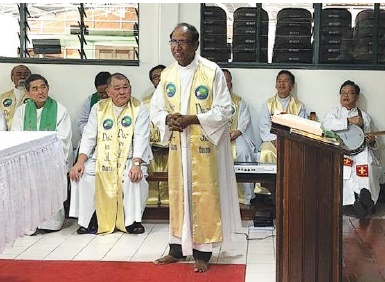Oct 2018
Sabah clergy attend retreat given by ‘barefoot priest’
KOTA KINABALU: Arch/bishops, clergy and deacons from the three arch/dioceses of Sabah were given a rare treat for their mid-year retreat with a barefoot priest from Tamil Nadu, India who was their retreat master at Bundu Tuhan retreat centre from Sept 10-14.
Natives going barefoot is not rare in the villages, but to have one barefoot Catholic priest walking and ministering amongst his peers, albeit from overseas, is a rare occurrence. Fr Jerry Rosario, SJ has earned his accolade as the “barefoot priest” internationally, not for his personal gratification but because he has willingly and lovingly accepted to live like this – embracing poverty and extending solidarity with the marginalised.
Fr Jerry has just two shirts and two slacks, walks barefoot, sleeps on a mat and travels only by public transport. For short distances, he rides his bicycle. He has no TV, no mobile phone, no computer, no bank account and not even a wrist-watch. He is a living legend. He has written 76 books and numerous articles.
(Foreword by Fr Antony Pancras in Perspectives, Possibilities, Practicalities of Leadership in the Light of the Life of Jesus)
This being his fifth retreat for Malaysian clergy, the Jesuit priest, who is also a professor, lawyer and social activist, finds Sabah unique and declares that he has put his “heart and soul” in facilitating the retreat exercises for the Sabah clergy.
Given the traditions, the clergy have got into a certain comfort zone. There is nothing wrong with that, he was quick to add, “but when comfort and conveniences consume the life of the ordained and consecrated, they need to be looked into,” underlined Fr Jerry.
He invited the clergy to respond to this concern in a pragmatic way – to say ‘no’ in their personal life, to be ready to go beyond themselves to “make a difference”, to be at the service of the people of God, particularly the least and the poorest.
To concretise their response, Fr Jerry suggested that they make an analysis of society crossing the boundary of Christianity, to read the signs of the times in terms of socio, economic, political, cultural, religious and ideological systems of the State, based on which they should monitor the pastoral responses in order to make their ministries relevant and radical.
Article reproduced from Herald Malaysia online


